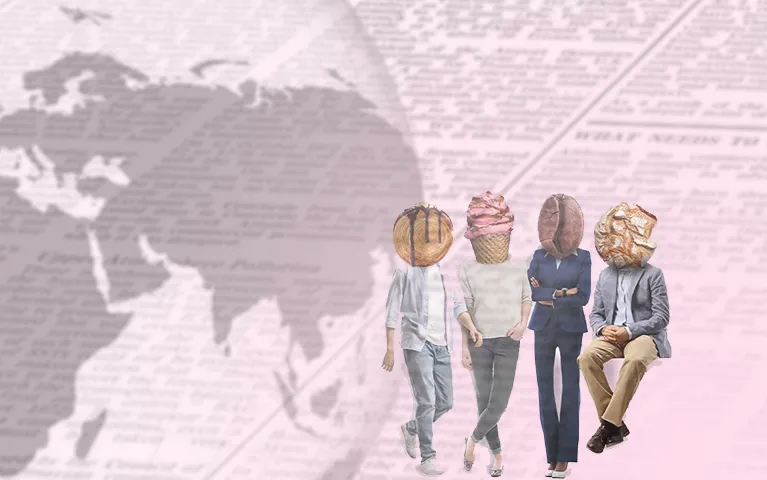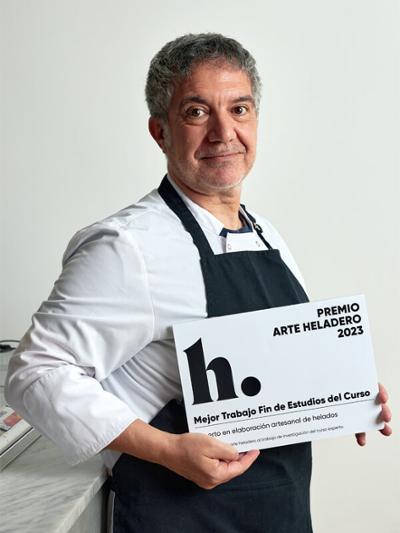

InterSICOP 2024 Main Sector Personalities: Luis Luque, new fat profile in vegan ice cream parlour

The winner of the Arte Heladero 2023 Award for Best Final Project will present his findings on vegan ice cream at the next edition of InterSICOP, which will take place from 17 to 20 February at Ifema Madrid.
Interview with Luis Luque, speaker at InterSICOP 2024
1.- You won the Arte Heladero Award for the Best Final Project 2023 of the University Expert Course in Artisan Ice Cream Production for an original and methodical exploration of vegan vanilla ice cream. What difference does this work make compared to others on a topic that is so topical and of such concern to the sector?
You don't apply for this prize, but to obtain the University Degree you have to carry out a research project. So I thought, what do I want to get out of this work when it is finished? I called the ice-cream maker Jordi Puigvert, and told him that I needed to study an ice-cream subject in depth, with the aim of knowing a lot about ice-cream. He is the one who suggested that I do some research on vegan ice cream. I told him that my approach is more oriented towards sustainability and not veganism, and he replied that if I study traditional dairy ice cream, I will only learn about it, but if I study vegan ice cream, I will know a lot more about ice cream in general, which is my goal.
Then I was lucky enough to realise something that was not being done in the artisan vegan ice cream industry, and which was a determining factor in the perception of these ice creams in the mouth. This materialised in the work on a new fat profile in artisan vegan ice cream. In order to develop it, I had to stick to that topic, but the more I looked into it, the clearer it became that there were several aspects to improve. A colleague and friend, who knows a lot about the subject, sums it up in the following sentence: "If our goal is to climb the Aneto, everything is clear in vegan ice cream, but if we are planning to climb Everest, we are just starting to study this subject". I am convinced that, in the short term, we will see more changes and innovations in this field.
2.- Did you expect to win the prize and has this encouraged you to continue researching the subject?
My background is linked to architecture, and it is important to be clear about what you expect to achieve when you enter a competition. Winning was never the main objective, because otherwise, when you don't win, the feeling is one of disappointment. I have only entered competitions in facets that I wanted to research and learn more about. The real objective was learning, and the prize was the one that set the deadlines, because for me, without deadlines, I find it difficult to force myself and move forward.
3.- At InterSICOP 2024 you will be comparing three pistachio ice creams. Can you tell us something about your presentation? Why pistachio and not another flavour?
I have chosen an ingredient, pistachio, which is a popular flavour with a high unsaturated fat content, which complicates everything technically, but it allows me to move forward and learn. In the showcases you can find it as a traditional dairy ice cream, or as a vegan pistachio ice cream. The idea is to make both, and compare them with the proposal for a new vegan fat profile.
I admit that I do not know what the result will be, as I am still testing, but as a listener, it is the proposal that interests me most. The new fat profile may be interesting on a theoretical level, but it will have no chance unless it brings benefits to artisan ice cream makers in practice.
If technically it works out well, if in terms of structure we reach the level of a traditional dairy ice cream, and the same in terms of its perception in the mouth (with the certainty that we have an advantage in the purity of flavour in a vegan ice cream, as there are no dairy flavours that compete with the main flavour), what we should ask ourselves is whether there is not a part of the ice creams in our showcase that could be made in a different way and in a more sustainable way. I leave that point to the attendees.
4.- Who do you think should attend your talk and why?
When I am asked to give this talk, I think of the professional artisans who have ice cream in their display cases and who are going to sit and listen to me for an hour. And I ask myself, what would I want them to tell me? If I had ice cream in my display case, what would interest me is to know if I could make any of them better than I am already making them.
Entrevista a Luis Luque, ponente en InterSICOP 2024
1.- Ganaste el Premio Arte Heladero al Mejor Trabajo Fin de Estudios 2023 del Curso de Experto Universitario en Elaboración Artesanal de Helados por una exploración original y metódica del helado vegano de vainilla. ¿Qué diferencia aporta este trabajo respecto a otros sobre un tema de tan actualidad y qué preocupa tanto al sector?
A este premio no te presentas, sino que la obtención del Título Universitario exige la realización de un trabajo de investigación. Así que pensé ¿qué quiero yo obtener de este trabajo cuando esté acabado? Llamé al heladero Jordi Puigvert, y le dije que necesitaba profundizar sobre un tema de heladería, con el objetivo de saber mucho sobre helados. Es él quien me propone investigar sobre helados veganos. Le digo que mi enfoque está más orientado a la sostenibilidad y no al veganismo, y me responde que si estudio sobre helados tradicionales lácteos, solo aprenderé sobre ellos, pero que si lo hago sobre helados veganos, sabré mucho más sobre heladería en general, que es mi objetivo.
Después tuve la suerte de darme cuenta de algo que no se estaba haciendo en la heladería vegana artesana, y que era determinante en la percepción en boca de estos helados. Esto se concretó en el trabajo sobre un nuevo perfil graso en heladería artesana vegana. Para poder desarrollarlo, tuve que ceñirme a ese tema, pero cuanto más profundizaba, más claro era que había diversos aspectos sobre los que mejorar. Un compañero y amigo, que sabe mucho del tema, lo resume en la frase: “Si nuestro objetivo es escalar el Aneto, está todo claro en la heladería vegana, pero si nos planteamos subir al Everest, estamos solo empezando a estudiar este tema”. Estoy convencido de que, a corto plazo, vamos a asistir a más cambios e innovaciones en este campo.
2.- ¿Esperabas ganar el premio? ¿Esto te ha animado a seguir investigando sobre el tema?
Mi pasado está vinculado a la arquitectura, y es importante tener claro qué esperas conseguir cuando te presentas a un concurso. Ganar nunca fue el objetivo principal, porque si no, cuando no ganas, la sensación es de decepción. Me he presentado a premios solo en facetas de las que deseaba investigar y saber más. El verdadero objetivo era el aprendizaje, y el premio era quien marcaba los plazos, porque a mí, sin plazos, me cuesta forzarme y avanzar.
3.- En InterSICOP 2024 realizarás una comparativa de tres helados de pistacho. ¿Nos puedes avanzar algo de tu ponencia? ¿Por qué de pistacho y no de otro sabor?
He escogido un ingrediente, el pistacho, que es un sabor demandado y con un alto contenido en grasa insaturada, lo que complica técnicamente todo, pero a mí me posibilita avanzar y aprender. En las vitrinas se encuentra como helado tradicional lácteo, o bien como helado vegano de pistacho. La idea es elaborar ambos, y compararlos con la propuesta de un nuevo perfil graso vegano.
Reconozco que no sé cuál va a ser el resultado, pues sigo haciendo pruebas, pero como oyente, es la propuesta que más me interesa. El nuevo perfil graso puede ser interesante a nivel teórico, pero no tendrá recorrido a no ser que en la práctica aporte beneficios a los heladeros artesanos.
Si técnicamente sale bien, si a nivel de la estructura llegamos a la altura de un helado tradicional lácteo, y lo mismo en cuanto a su percepción en boca (con la certeza de que tenemos ventaja en la pureza de sabor en un helado vegano, pues no tenemos sabores lácteos que compitan con el sabor principal), lo que cabe preguntarse es si no habría una parte de los helados de nuestra vitrina que podría elaborarse de una forma diferente y de paso más sostenible. Ese punto se lo dejo a los asistentes.
4.- ¿Quién crees que debería asistir a tu ponencia y por qué?
Cuando me proponen esta ponencia, pienso en los profesionales artesanos que tienen helados en sus vitrinas, y que se van a sentar a escucharme durante una hora. Y me planteo ¿qué querría yo que me contaran? Si yo tuviera helados en mi vitrina, lo que me interesaría es saber si puedo elaborar alguno de ellos mejor de cómo ya lo estoy haciendo.




